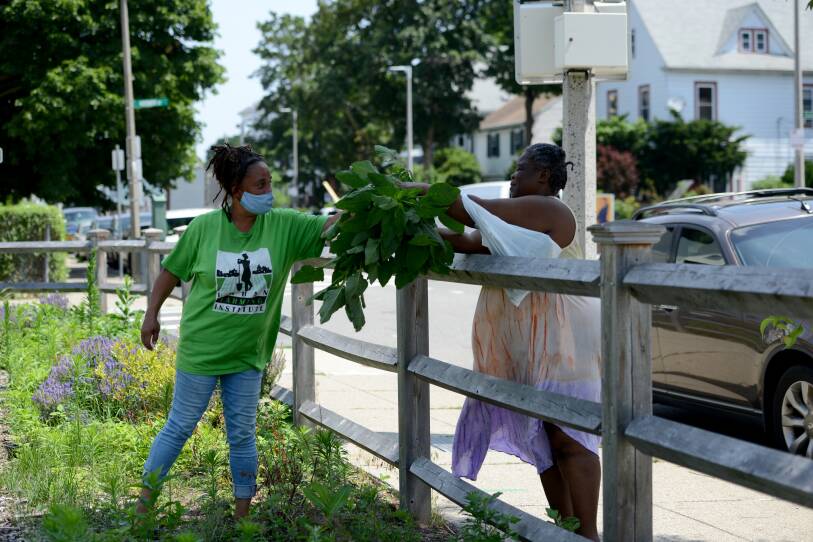Nearly half a million acres of Massachusetts is agricultural land, with more than 7,000 farms, most of them classified as small farms. And while more than a third are owned or operated by women, less than two percent are owned or operated by Black farmers. The dearth of Black farmers in Massachusetts is in line with the industry nationally. According to the most recent United States Department of Agriculture census (2012), nearly 95 of America's farmers are white. Black farmers are in charge of day-to-day operations on just 1.6 percent of American farms.
Boston residents Nataka Crayton and Bobby Walker began their journey to becoming farmers back in 2008. At the start, all they wanted, really, was to have a farmer’s market in their lower Roxbury neighborhood.
"When we first came in we were the only Black people involved. Like, we went into a couple of meetings and we were the only Black people in the room and it was actually uncomfortable," said Walker, describing their early efforts to recruit partners for a fresh food market.

"All the people that we were talking to were like, 'Nah, we don’t want to come to your neighborhood.' And we were like, 'OK,'" Walker said with a chuckle. "So, we decided that we have to do it for ourselves."
So, they became farmers. And while both Walker and Crayton had gardening skills, learning to farm was a whole different ballgame, said Crayton.
"We literally had to put our pieces of lettuce together — like four or five of them in order to make a full head of lettuce," she said. "That’s how bad we were in our learning curve."
They figured it out. Today the organization they help manage, The Urban Farming Institute, operates seven farms in Roxbury, Dorchester, and Mattapan. They sell fresh produce to residents and local restaurants, and continue to open pathways for others in their neighborhood through an education program.
"We do need more skilled, trained individuals and not just to work for other people," said Crayton. "We need to build up our skills and abilities so that we can work for ourselves as Black people."
The Urban Farming Institute is one of some two dozen organizations that have received grant money from the state’s Urban Agriculture program. Rose Arruda coordinates that program, which has invested some 2.5 million dollars since 2014.
"I’m not gonna sugar coat [it] — like, 'Oh, there are no problems. There's lots of diversity.' No there isn't. But I feel that there’s definitely inroads being made," she said. "There is a new pipeline coming."
But where does that pipeline lead?
Diversity among farmers in urban agriculture may be improving, but city farms are small — and a small slice of the overall agricultural pie. Larger farms in Central and Western Massachusetts remain overwhelmingly white owned and operated.
"A lot of these farms have been long time family farms that have existed for generations," said Arruda.
According to data from the U.S. Department of Agriculture, more than 5,000 Massachusetts farms are individually owned. Just 21 of them are owned by a Black individual.

Arruda’s work includes helping foster relationships between urban and rural farmers so that urban farmers might make inroads at larger scale operations, like the Farm School in Athol, Massachusetts.
"At the Farm School we cut down trees for wood, we have mushrooms, we have chickens, pigs, dairy cows, beef cows, and then we have different vegetables that we produce," said John Steven Deloatch Giraldo, who came to the Farm School as a New York City urban farmer. He now farms and teaches there.
"Farming ... can [be] rough and gritty, but it can also be healing when taught right. It can be empowering when taught right," he said. "We can grow our own food and gain a sense of independence and self-sufficiency and then make sure our communities are also taken care of."
The road is tough for any entrepreneurial farmer looking to grow. Farmable land is expensive and in short supply. And farmers of color face additional challenges, both current and historic, said Larissa Jacobson, co-director at Soul Fire Farm, just northwest of the Massachusetts border in New York.
"There was a point in our history when Black farmers operated millions of acres of land," she said. "And due to USDA discrimination, racialized violence and inequities in the legal system, they lost over 12 million acres."
In addition to farming and educating, the team at Soul Fire Farm also spearheads the Northeast Farmers of Color Land Trust, a non-profit collective that aims to acquire land throughout New England for Farmers of Color to tend. "The way we frame it at Soul Fire Farm is, ‘to free ourselves we must feed ourselves,'” said Jacobson.
"What really needs to happen is action to address this history of land and labor theft that has occured in this country," said Jacobson.
Everyone I talked with spoke with urgency about the issues of food insecurity and a lack of access to fresh foods in neighborhoods. Both are burdens born disproportionately by people of color. The reasons for this are myriad. And the food system is complex. But it’s not a stretch to imagine that more equity at the end of the food chain might be achieved by an increase in diversity among those calling the shots at the top of it.




